GRBusiness
Wike, Magu showdown loading over alleged N117b transactions


Detectives are probing about N117b suspicious transactions by the government of Rivers State in the last three years.
The huge cash was intermittently withdrawn over the counter by a state official designated for the purpose, Economic and Financial Crimes Commission (EFCC) sources said at the weekend.
There were indications that the withdrawals from the state accounts were laundered by some state officials.
The state government yesterday described the probe as a “political witch-hunt” and vowed not to be intimidated.
Four suspects have been shortlisted for interrogation in connection with the massive withdrawals. They include an official in charge of Finance and Accounts at the Government House in Port Harcourt and a cashier.
The EFCC has detained a bank’s Managing Director (MD), who admitted that N5.2billion was realised as charges for the “controversial” transactions.
According to the sources, the withdrawals were made in tranches of N10million with as many as 50 cheques cashed in a day.
The sources said it was a case of “gross violation” of the Money Laundering (Prohibition) Act of 2011.
One of the sources said: “Based on intelligence report, the EFCC swung into action.
“Our findings indicated that the withdrawals were made in cash from the state accounts mostly by one person. There are no records of what the cash was used for. We are working on clues that it was diverted.
“The EFCC team has obtained all the records of the withdrawals, including date and time. For instance, on June 8, 2015 barely few days in government, about 45 cheques amounting to N450million were cashed over the counter for no justifiable purpose.
“Also, on June 9, 2015 about 50 cheques amounting to N500million were withdrawn. We will soon release the details of findings by our team.”
Another source spoke of how a bank chief was quizzed last Thursday and released on administrative bail.
“But he was asked to come back on Friday and we have been interacting with him up till Sunday. He admitted that all the withdrawals were made over the counter in cash.
“He also said the bank benefited about N5.2billion from the charges collected on the transactions,” the source said.
Another source said the bank was guilty of “lack of Suspicious Transaction Report(STR)” and violation of Money Laundering (Prohibition) Act 2011, especially sections on special surveillance on certain transactions and Limitation to make or accept cash payment.
The Act reads: “Special surveillance on certain transactions.
“6. (1) Where a transaction –
(a) involves a frequency which is unjustifiable or unreasonable;
(b) is surrounded by conditions of unusual or unjustified complexity;
(c) appears to have no economic justification or lawful objective; or
(d) in the opinion of the Financial Institution or Designated Non-Financial Institution involves terrorist financing or is inconsistent with the known transaction pattern of the account or business relationship, that transaction shall be deemed to be suspicious and the Financial Institution involved in such transaction shall seek information from the customer as to the origin and destination of the fund, the aim of the transaction and the identity of the beneficiary.
(2) A Financial Institution or Designated Non-Financial Institution shall within 7 days after the transaction referred to in subsection (1) of this section –
(a) draw up a written report containing all relevant information on the matters mentioned in subsection (1) of this section together with the identity of the principal and where applicable, of the beneficiary or beneficiaries;
(b) take appropriate action to prevent the laundering of the proceeds of a crime or an illegal act; and
(c) send a copy of the report and action taken to the Commission.
(3) The provisions of subsections (1) and (2) of this section shall apply whether the transaction is completed or not.
(4) The Commission shall acknowledge receipt of any disclosure, report or information received under this section and may demand such additional information as it may deem necessary.
(5)(a) The acknowledgement of receipt shall be sent to the Financial Institution or Designated Non-Financial Institution within the time allowed for the transaction to be undertaken and it may be accompanied by a notice deferring the transaction for a period not exceeding 72 hours.
(b) Notwithstanding the provisions of paragraph (a) of this subsection, the Chairman of the Commission, the Governor of the Central Bank or their authorized representative shall place a Stop Order not exceeding 72 hours, on any account or transaction if it is discovered in the course of their duties that such account or transaction is suspected to be involved in any crime.
(6) If the acknowledgement of receipt is not accompanied by a stop notice, or where the stop notice has expired and the order specified in subsection (7) of this section to block the transaction has not reached the Financial Institution or Designated Non-Financial Institution, it may carry out the transaction.
(7) Where it is not possible to ascertain the origin of the funds within the period of stoppage of the transaction, The Federal High Court may, at the request of the commission, or others persons of authority duly authorized in that behalf, order that that the funds, accounts or securities referred to in the report be blocked.
(8) An order made by the Federal High Court under subsection (7) of this section shall be enforced forthwith.
Finance
Banks To Now Charge 0.5% Cybersecurity Levy As Directed By CBN; Netizens React
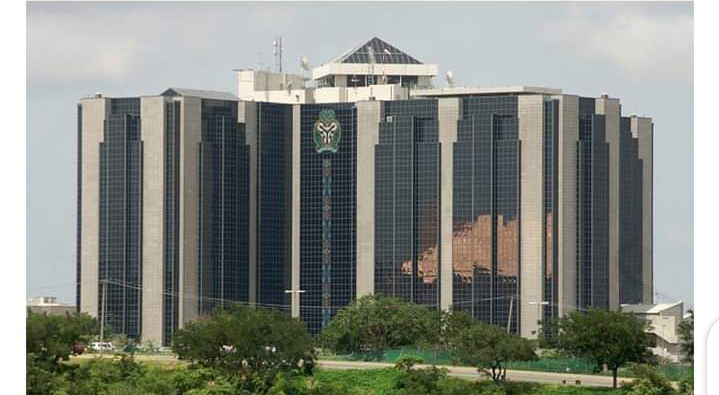

The Central Bank of Nigeria (CBN) has directed deposit money banks in the country to start charging 0.5% cybersecurity levy on some transactions done by their customers.
The apex bank gave the directive in a circular dated May 6, 2024 and sent to all commercial, merchant, non-interest and payment service banks as well as mobile money operators and payment service providers.
“Following the enactment of the Cybercrime (Prohibition, Prevention, etc) (amendment) Act 2024 and pursuant to the provision of Section 44 (2) (a) of the Act, ‘a levy of 0.5% (0.005) equivalent to a half percent of all electronic transactions value by the business specified in the Second Schedule of the Act’, is to be remitted to the National Cybersecurity Fund (NCF), which shall be administered by the Office of the National Security Adviser (ONSA),” the circular partly read.
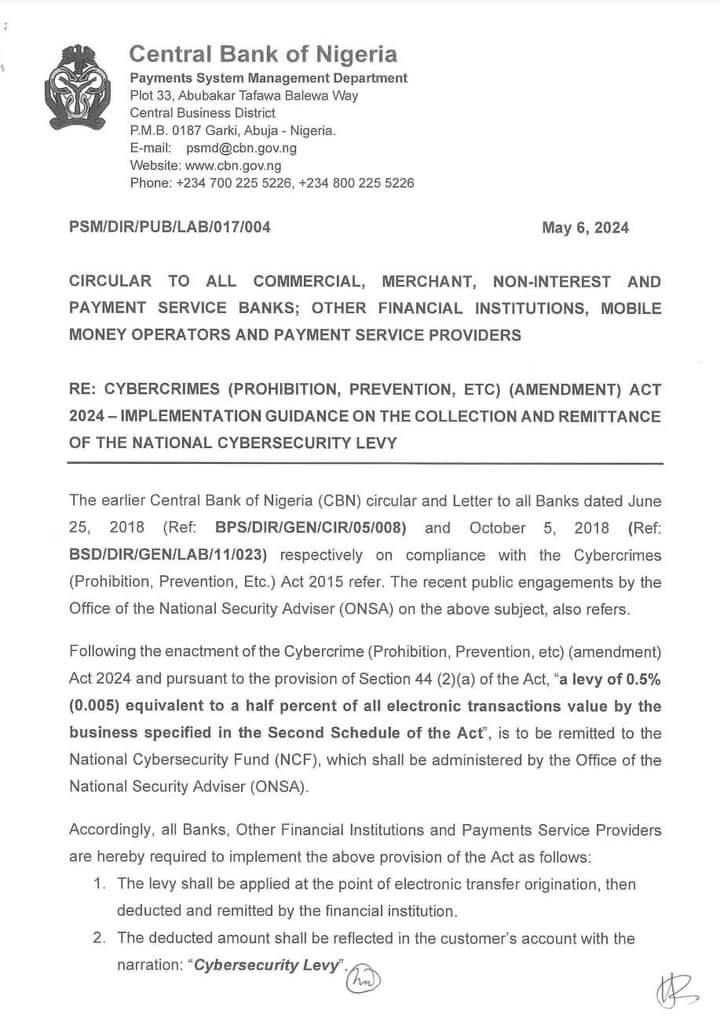

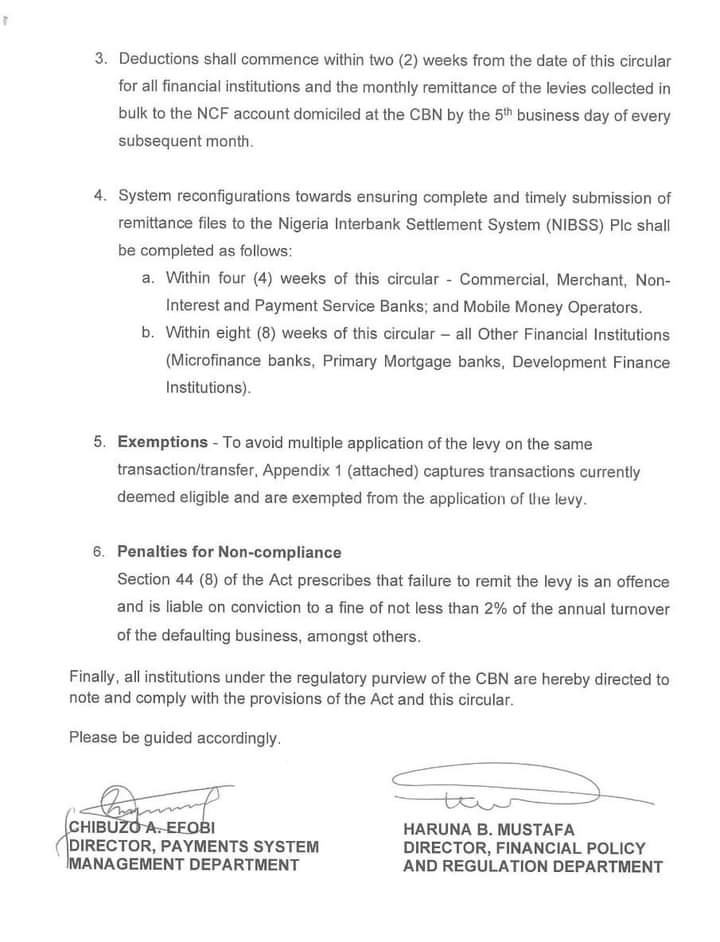

The apex bank said that the implementation of the levy would start two weeks from the date of the circular.
“The levy shall be applied at the point of electronic transfer origination, then deducted and remitted by the financial institution. The deducted amount shall be reflected in the customer’s account with the narration, ‘Cybersecurity Levy’. Deductions shall commence within two weeks from the date of this circular for all financial institutions and the monthly remittance of the levies collected in bulk to the NCF account domiciled at the CBN by the fifth business day of every subsequent month,” the circular said
The apex bank added that this new levy will not be applied on transactions such as loan disbursements and repayments, salary payments, intra-account transfers within the same bank or between different banks for the same customer, intra-bank transfers between customers of the same bank.
Also exempted from the levy were inter-branch transfers within a bank, cheque clearing and settlements, Letters of Credits, Banks’ recapitalisation-related funding only bulk funds movement from collection accounts, savings and deposits including transactions involving long-term investments, among others.
This current implementation however is not sitting well with some netizens as they reacted to the new development.
Here were some of their reactions from X.
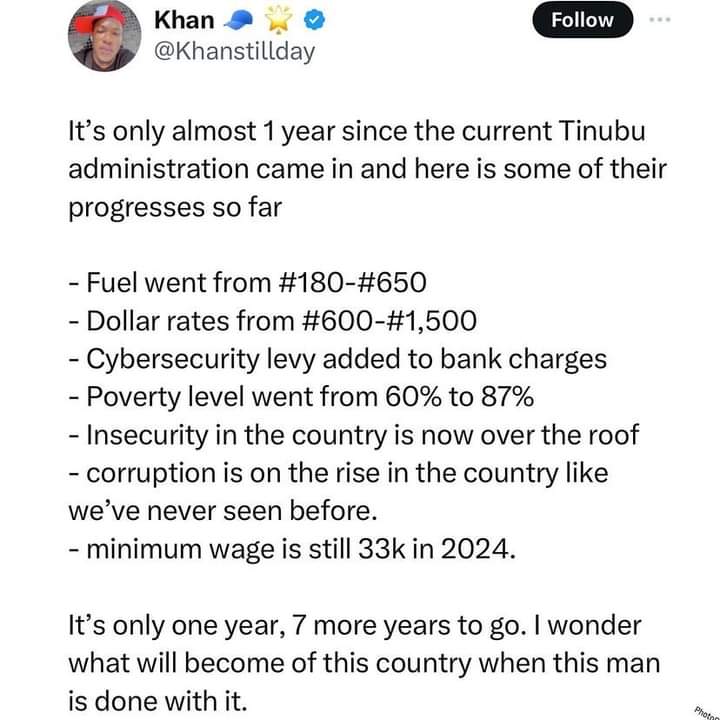

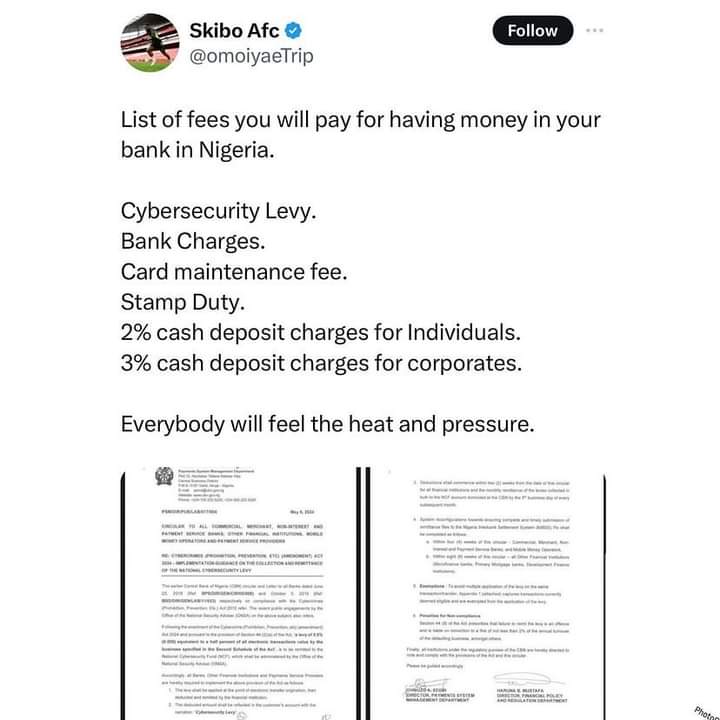

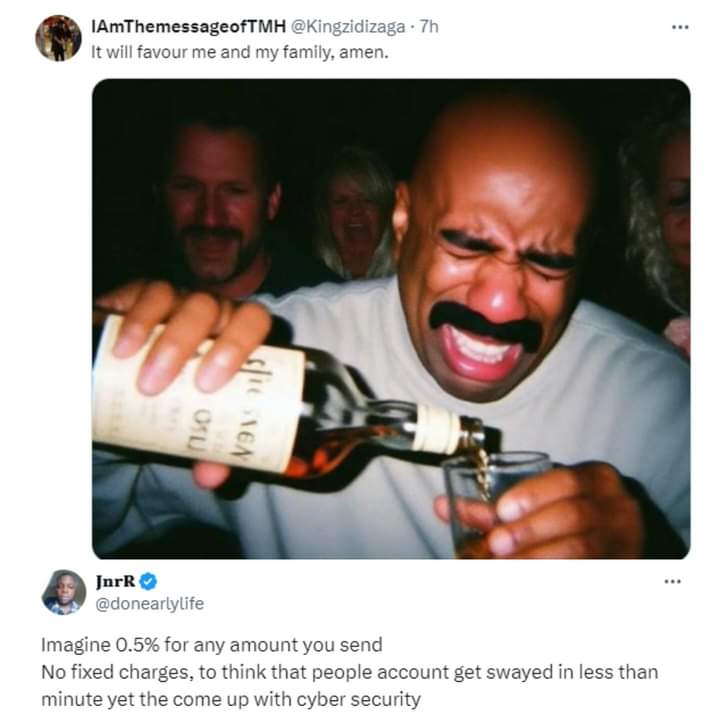

Finance
EFCC Chairman Tasks Nigerian Youths Against Crimes And Fraudulent Acts
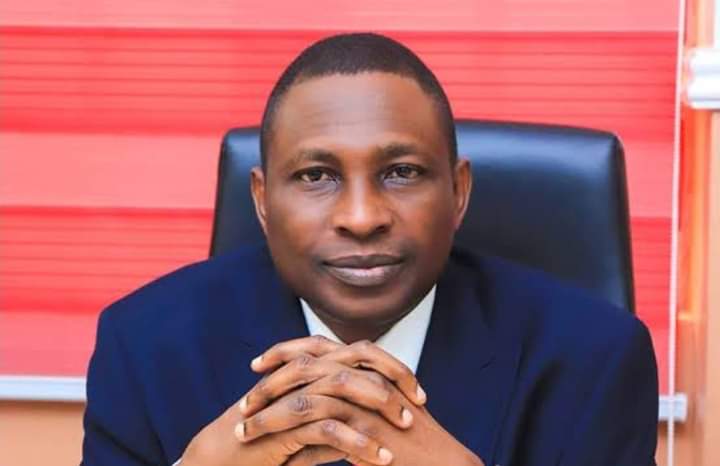

The Chairman of Economic Finance Crime Commission (EFCC), Ola Olukoyede, has stressed the need for Nigerian Youth to see themselves as agents of positive change that have a lot to contribute to the socioeconomic development of the Nation.
Speaking at the 2nd edition of a Leadership Trainings Programme in Abuja, Olukoyede, who was represented by the Head Enlightenment and Re-orientation unit, (EFCC), Aisha Mohammed, said the commission’s dream is to see the youth contribute meaningfully to the society, emphasizing on the need to work together in bringing positive change to society.
The Economic and Financial Crimes Commission Boss declared the readiness of his agency to work with all Stakeholders, including the youth towards changing the narrative and reposition the country to greater exploit.
Also speaking, the representative of the Executive Secretary of Tertiary Education Trust Fund (TETFUND), Sonny Echono, appealed to the youths is to eschew social vices that could deter their full potential in life.
Other speakers at the event, including the Chairperson, Zero Tolerance for Social Immoralities Initiative (ZEITI) Africa, Rasak Jeje called on all stakeholders to join hands in collective pursuit of empowering new generation of leaders to curb the rising tides of social Vice among Nigerian youths.
The Chairperson, Zero Tolerance for Social Immoralities Initiative (ZEITI) Africa, Rasak Jeje made the call while addressing journalists at the 2nd edition of it Leadership Trainings Programme in Abuja on Thursday.
He said the training was aimed to intimate students leaders with knowledge and insights that will help them drive positive change and become exemplary leaders in their respective spheres.
Finance
AISA Has Refunded The Fees Paid By Yahaya Bello To EFCC


The Economic and Financial Crimes Commission (EFCC) says the American International School Abuja (AISA) has refunded the fees paid by the immediate past governor of Kogi state, Yahaya Bello, for his children attending the school.
In response to a letter addressed to the Lagos zonal commander of the EFCC, the school said $845,852 was paid in tuition “since the 7th of September 2021 to date”.
AISA said the sum to be refunded is $760,910 because it had deducted educational services already rendered.
“Please forward to us an official written request, with the authentic banking details of the EFCC, for the refund of the above-mentioned funds as previously indicated as part of your investigation into the alleged money laundering activities by the Bello family.
Since the 7th September 2021 to date, $845,852.84 (Eight Hundred and Forty-Five Thousand, Eight Hundred and Fifty Two US Dollars and eighty four cents) in tuition and other fees has been deposited into our Bank account.
We have calculated the net amount to be transferred and refunded to the State, after deducting the educational services rendered as $760,910.84. (Seven Hundred and Sixty Thousand, Nine Hundred and Ten US Dollars and Eighty Four cents).
No further additional fees are expected in respect of tuition as the students’ fees have now been settled until they graduate from ASIA.”
In a chat with The Cable, the spokesperson of the EFCC, Dele Oyewale, confirmed that the school has refunded the money.
‘’The money has been paid into public account,” Dele Oyewale was quoted as saying
-



 Politics2 days ago
Politics2 days agoLagos Water Corporation Starts Protest Against Sack Of Workers
-



 News4 days ago
News4 days ago“80% Of Buildings In Lekki Have No Approval” – Lagos State Commissioner For Physical Planning & Urban Development Reveals
-



 Entertainment4 days ago
Entertainment4 days agoCelebrities Turn Up For The Dedication Of Ali Baba’s Triplets In Lagos
-

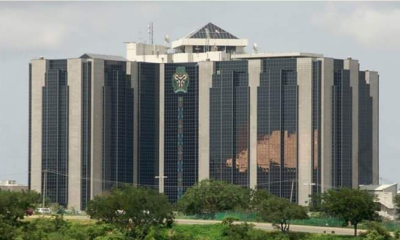

 Finance3 days ago
Finance3 days agoBanks To Now Charge 0.5% Cybersecurity Levy As Directed By CBN; Netizens React
-



 TechNews4 days ago
TechNews4 days agoSIM Boxing, And The Unboxing of a Crime Syndicate
-



 GRTech3 days ago
GRTech3 days agoSHELT SI Achieves Cisco Select Partner Certification
-



 News2 days ago
News2 days agoEkiti Students Caught On Camera Bullying A Fellow Student, Have Been Expelled
-



 Politics19 hours ago
Politics19 hours agoSenate Amends NDLEA Act, Approves Death Penalty For Dangerous Drugs Manufacturers And 15 Years Imprisonment For Users








